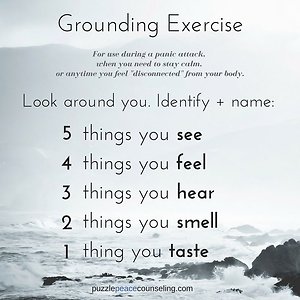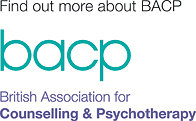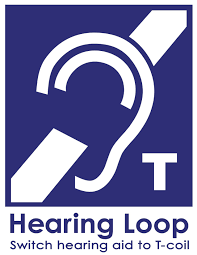Anxiety
We all feel anxious from time to time. Ifm we have an interview coming up or an exam or moving house, these are all situations that can cause anxiety. When it becomes an overwheing feeling thst starts to stop us from doing things we want to do, like going outside shopping, then it can be something we need to address.
Common symptoms of anxiety;
- thoughts racing
- difficulty concentrating
- feeling restless and tense
- irritable or angry
- breathing becomes shallow
- tightness in your chest
- maybe stuttering or lost for words
- feeling unable to move
- heart beat increasing
- feeling hot and sweaty
Dealing with anxiety and reducing it quickly using breathing or breathwork. Start to focus on your breathing and then breath in through the nose and count to 4, or draw a box in your mind. Then breath out of your mouth for 4 drawing the box again, repeat this until the tightness in your chest reduces. Also useful is diaphragmatic breathing, focus on breathing deeply so your stomach rises and the breath out through your mouth. With repetition you will start to feel less anxious.
Other ways to deal with anxiety are keeping hydrated, physical activaty, distraction and grounding; see below. Also have laughter in your life, whether it is with others or on your own watching a funny film, make pleasure a priority. Talking to a trusted friend or see a therapist, sharing your feelings allows you to process what is happening for you and then setting goals to deal with the situation.
Panic Attacks
A panic attack is a sudden and intense feeling of anxiety and fear that can results in physical symptoms. They can happen without warning and for no obvious reason. We can be triggered by every day of experiences, like a busy road, a noisy city, being lost whilst driving in the car, walking by a group of children or teenagers, going into a shop, paying for goods if there is a que behind you, doing exercise in a gym, going to the swimming baths.........
There are things you can do whilst in a panic attack, because when they happen it can feel like you are going to die! Start by recognising that you are having a panic attack, see below for symptoms, then focus on your breathing and deep breath using the box method or diagraphamatic breathing described above. Then focus your attention on something else, the room you are in, your bag or clothes, start to notice your senses and use the grounding techniques below. Take a seat, safely, put both feet squarely on the ground and rest and relax. Close your eyes if you like or leave them open, use positive self talk to remind yourself that you are not going to die and that this will pass.
Panic attacks can also happen if we are triggered by a memory, or the memory just pops into our mind from nowhere. It can cause symptoms like;
- a feeling of choking,
- heart racing,
- pins and needles,
- dizziness,
- nausea,
- muscular pain.
Symptoms of panic attacks;
- overwhelming fear
- a sense of impending doom or damger
- fear loss of control or death
- feeling hot
- feeling nauseous
- burping and indigestion
- racing heart rate
- sweating
- legs feeling heavy
- trembling or shaking
Grounding Yourself.
If you suffer from PTSD, Anxiety, or any other mental health issues, grounding yourself is extremely useful to learn and it can help to deal with panic attacks By focusing on our senses we allow space in our mind to calm down. We are using the senses that are part of our nerveous system, eyes, ears, smell. touch and taste, this can directly impact our parasympathetic nerveous system so our body will srtat to feel better and relax more.
Calming our emotional state, which is directly linked to our nerveous system via our stomach and our senses, hepls us to feel more in control over ourselves and gives us more confidence to be ourselves.
Trauma
A traumatic event can happen to any one, in fact what may be considered traumatic to one is not to another. We all have our own way of dealing with events that happen to us. Our process is important and totally individual to us. A comparison to others can be useful, if it tells us we may be suffering more than others and helps us get help. However, it is not useful if it makes us feel less because we are suffering more and start to hide how we feel so we do not appear odd.
PTSD (post traumatic stress disorder) has been associated with soldiers coming home from a war. Yet, we can all suffer the after effects of a frightening event. These might include; natural disasters, serious accidents, assault or abuse. It can be long term or short lasting only a few weeks after the event.
Most people will experience trauma after an event, however with ptsd it can involve reliving the event with emotional and physical involuntary responses. Flashbacks and nightmares are common, including being back in the event as it happened, you may feel the need to avoid places or things relating to the event, experience constant reactive arousal (for example always feeling “on-edge”) or have cognitive difficulty or mood changes. Physical symptoms like sweating and a racing heart, feeling detached or empty, tense or irritable. This could result in difficulties sleeping, holding a job down, keeping your relationship on track and being unable to concentrate.
There are certain symptoms that are common with ptsd, I have listed the most common ones below. Remember, everyone is different and we all have our personality and ways of processing our thoughts and feelings. There is no right or wrong, what you feel is what you feel.
1. Flashbacks and Nightmares
2. Reliving the experience/trauma
3. On edge or red alert
4. Physical symptoms like heart racing
5. Panic, anxiety, depression
6. Being moved to tears easily
7. Anger and aggression
8. Tense muscles
9. Guilt and shame
10. Self Harm and Suicide
Flashbacks
How to recover from a flashback.
This is a tried and tested method. It is all about Mindfulness and being present in the moment. Being in the here and now rather then the then and there, which is where you find yourself when you experience a flashback.
When you experience a flashback you are back in the painful memory with the emotions or physical pain that went with it, so recovery is vital.
To help bring yourself back from pain, whether it is emotional or physical, use a mantra. It can be something like "Be here now." You can say this to yourself whenever you need to or you can make up your own one. It can add weight to it if you use your own name at the end, and create a sense of comfort, a bit like you got your own back!
So, you could say "Be here now, Victoria". Basically it is all about bringing yourself back to now and away from the flashback and past pain.
We all need tools to help us through the tough spots, share this post with your friends so we can all feel better.
Triggers
If you suffer from PTSD or Anxiety you may already know what triggers are and what your personal ones are. You may also suffer but not be aware of your triggers, this is when therapy can help.
Triggers can be anything and they can happen at any time. They will be the start of a panic attack or an anxiety attack. They can last for minutes and the after effects can last for hours or days. They can mess with your emotions and mess your plans up, the trip that you planned months ago may be cancelled because a trigger occurred and you suffer.
Because triggers are out of your control, for example, the sound of the a football match and the crowd chanting in the background, they take you by surprise, even shock and cause confusion. The sufferer can be transformed back to the original event instantly, but start to re-experience all the emotions including fear, of the original event. This, of course, can be very unsettling and cause confusion, anxiety and panic.
By understanding what our triggers are we can accommodate them and incorporate them into out lives. Like not being near the tv when football is playing, or working out why we are triggered and start a re framing process.
They are also very personal because they can be a direct link to past trauma, so, of course, they are only yours. No other person feels this way or has them in conjunction. Finding out what yours are can help you to control your reactions by affirming to yourself that you are not in danger and then you can recover quicker.
Triggers are a part of recovery from Trauma, they may not disappear through therapy, but you can find a way to deal with them and therefore heal from your trauma.
Post Traumatic Stress Disorder and Complex Post Traumatic Stress Disorder
Post traumatic stress Disorder can affect anybody. It can last for days, weeks or years. It can happen because the person has been in a traumatic event, or they have seen one as a witness (this can include watching the news) or one of their loved ones has a traumatic event. It can happen straight after the event or years later and can be triggered by other events, which may or not be traumatic.
There are some specific symptoms listed below; but mainly they are suffering flashbacks, triggers and emotional reactions.
Increased anxiety and emotional arousal
Hypervigilance (On constant ‘red alert’)
Intense physical reactions to reminders of the event (e.g. Pounding heart, nausea, muscle tension, sweating)
Irritability or outbursts of anger
Irrational and intense fear
Reduced tolerance to noise (hyperacusis)
Difficulty concentrating
Being easily moved to tears
Panic attacks/anxiety/depression/mood swings
Feeling jumpy and easily startled
Difficulty falling or staying asleep
Anger or aggressive behaviour
Tense muscles
Avoidance and numbing
Work-related or relationship problems
Inability to remember important aspect of the trauma
Loss of interest in activities and life in general
Sense of a limited future
Feeling numb and empty
Avoidance of people and places
Feeling isolated
Frequent periods of withdrawal into oneself
Re-experiencing the traumatic event
Flashbacks (Acting or feeling like the event is happening again)
Nightmares (either of the event or of other frightening things)
Feelings of intense distress when reminded of the trauma
Other common symptoms
Feeling suicidal
Self harm and self-destructive tendencies
Feeling distrustful and suspicious/blaming others
Guilt, Shame, embarrassment or self blame
Misuse of alcohol/drugs/gambling and/or food
Exhaustion
Seeking out high-risk/dangerous pursuits
Physical aches and pains
Over-reactions to minor situations
Fear of being alone and fear of being in crowds
Complex Post Traumatic Stress Disorder (cptsd)
Emotional Toolkit
A mental health tool kit, or a survival kit, is something that you can carry around in your bag, or have in your pocket.
It is things that help if it starts to become overwhelming at the holiday time, especially if you celebrate Christmas.
So, for example, you may have difficulties with your parents or partner and the holidays is when we all spend more time together!
1. Something to fiddle with!
A pen, a little toy or a mascot, something to grab onto when it starts to get tough.
2. A bottle of water
This can help if your mouth goes dry and you feel like you are choking.
3. Something soft
This is like a comfort blanket, but smaller, so it is portable. A silk scarf is good that feels soft.
4. Sweets and chewing gum.
Focusing your attention on what you are eating or chewing is great for re-framing the situation/interaction.
5. A journal or colouring book.
Anything that helps with doodling, writing down thoughts, colouring for a distraction and a help calming.
6. Letters or messages from supportive friends.
Since you may not feel like contacting friends, or they may not be reachable, having letters, texts and messages ready to look at.
It is a hard time of year for some people, especially if you do suffer with anxiety, never underestimate the force of trying to have a good time when you are not having a good time. It is exhausting.




